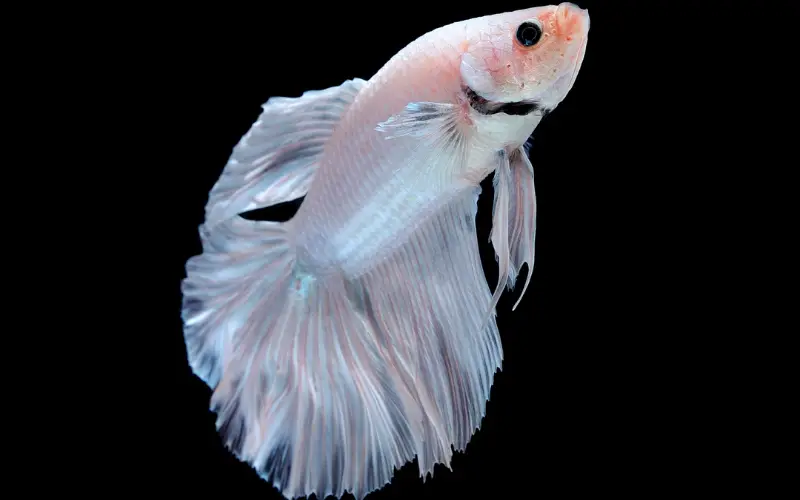Why did my betta losing color and laying on bottom of tank? Are you a proud keeper of a beautiful betta fish, but you’ve recently noticed it’s losing color and laying on the bottom of the tank?
If you notice your betta fading colors, this can cause concern and leave you wondering what’s wrong with your beloved pet.
Betta fish are known for their spirited colors and unique personalities, so seeing betta fish lost color can be alarming. But don’t worry; we’ve got you covered!
In this article, we’ll explore why betta fish may experience discoloration and lethargy and provide solutions to help your betta fish stay healthy and happy.

Whether you’re wondering, “Why is my betta fish losing color?” or “My betta fish laying on bottom of tank,” we’ve got you covered.
So, let’s dive in and understand why is my bettas color fading, lets solve the mystery of betta fish’s lost color together!
Table of Contents
ToggleWhy is my Betta Losing Color and Laying on Bottom of Tank?
Why is betta fish losing color? Bettas are known for their vibrant colors, ranging from bright reds to deep blues and greens. However, bettas can lose color for various reasons, including stress, illness, anchor worms, and poor water parameters.
Stress: Bettas are prone to stress, which can cause them to lose color. Stressful conditions include a small tank, aggressive tank mates, or sudden water temperature or quality changes. If your betta fish is stressed, it may appear betta fish faded color and spend more time laying on the tank bottom.

Illness: Betta fish can also lose their color due to illness. Common betta fish diseases that can cause betta’s color loss include Ich, Velvet, and Fin Rot. If your betta is sick, they may also exhibit other signs, such as lethargy, loss of appetite, and developing white spots or patches on their body.
Poor water conditions: Finally, poor water conditions can also cause betta fish to lose color. Bettas are sensitive to changes in water parameters such as pH, ammonia, and nitrite levels. If the water quality in your betta fish tank is poor, they may appear betta fish faded color or pale, and you may find your betta fish laying at bottom of tank.
What Does it Mean When Betta Fish is Turning White?
What does it mean my betta fish color is fading? Betta turning white can be a cause for concern, as it can indicate a serious health issue. The common reason of betta fish turns white is a fungal infection.
Fungal infections can occur due to poor water quality or fish skin injuries. If your betta fish change color, you may also notice white patches or spots on its body.
Other potential causes of betta fish turning white include bacterial infections, parasites, and stress. If your betta fish colors turn white, preventing infection from spreading and causing further damage to the fish’s health is important.
What did it mean When a Betta Fish is Laying on the Bottom of Tank?
Betta fish laying on bottom of a tank can indicate something is wrong. While it’s normal for betta fish to occasionally rest on the bottom of an aquarium, prolonged inactivity can indicate a health issue.
Betta fish may lay down on the bottom of the tank due to stress, illness, or poor water parameters. Stressful conditions include a small tank, aggressive tank mates, or sudden water temperature or quality changes.
Illnesses that can cause betta fish to lay down include swim bladder disease, fin rot, and dropsy. Finally, poor water quality can also cause betta fish to lay on the bottom tank, as they may struggle to breathe due to high ammonia or nitrite levels.
How to Keep Your Bettas Healthy and Happy
Providing them with an appropriate tank, water tank conditions, and diet is significant. To keep your betta happy, Here are some tips for keeping healthy betta fish:
Tank: Betta fish need at least a five-gallon tank to thrive. A smaller tank can cause stress and poor water conditions, leading to health issues. Additionally, betta fish prefer tanks with plenty of hiding spots and plants, as this mimics their natural environment.
Water conditions: Betta fish require specific tank conditions to stay healthy. The water tank temperature should be between 76 and 81 degrees Fahrenheit, and the pH should be between 6.5 and 7.5.
Additionally, betta fish require clean water with low ammonia, nitrite, and nitrate levels. Perform regular tank water changes and monitor water parameters to ensure that your betta fish’s tank is a healthy environment.
Diet: Betta fish require a varied diet, including protein and vegetation. Give your betta fish high-quality foods, supplemented with live or frozen fish foods such as brine shrimp or bloodworms. Avoid overfeeding your betta fish, which can cause bloating and other health issues.
Tank mates: Betta may be aggressive towards other fish, so choosing tank mates is important. Avoid keeping betta fish with other aggressive fish and adding too many pet fish to the tank. Additionally, ensure the tank is large enough to support multiple fish without causing stress.
Helping Your Betta Fish Recover
If your betta fish is experiencing symptoms such as fading color or laying on the bottom of the tank, there are steps you can take to help them recover. Here are some solutions to common betta fish health issues:
Color change:
- If your betta is losing its color, start by testing the water quality in their tank.
- Ensure the water parameters are within the appropriate range and perform a water change if necessary. If the water quality is good, consider adding a few live plants to the tank, as this can help reduce fish stress and provide a more natural environment.
- Ensure your marble betta fish’s diet is varied and high-quality.
Fungal infection: If your betta fish is turned white due to a fungal infection, it’s important to act promptly to prevent it from spreading. Treat the tank with fungal medication, and ensure optimal water tank quality. Additionally, avoid overcrowding the tank and ensure appropriate water temperature.
Swim bladder disease: If your fish is laying on the bottom of tank due to swim bladder disease, start by reducing the amount of food you feed them. Overfeeding can cause swim bladder disease, so it’s important to ensure that your betta fish only eat what they need.
Additionally, you can try put in a small amount of Epsom salt into the tank to help reduce inflammation.
Fin rot: If your betta’s fins are frayed or torn, they may be experiencing frayed fins rot. This bacterial infection can be caused by poor water quality or stress. Start by testing the water quality in the tank, and perform a water change if necessary. Additionally, treat the tank with a bacterial medication to help eliminate the infection.
Dropsy: Dropsy is a serious condition that can cause betta fish to lay on the bottom of the tank and is often fatal.
If your betta fish is experiencing dropsy, start by testing the water quality in the tank and ensuring that it’s optimal. Additionally, treat the tank with a bacterial medication, and consider adding aquarium salt to the water to help reduce inflammation.
How Can I Boost My Betta’s Immune System?
There are several ways to boost your betta fish’s immune system, which can help prevent illnesses and keep your fish healthy.
- Provide a balanced diet with high-quality food and occasional live or frozen foods.
- Keep the water clean and maintain appropriate water parameters.
- Avoid overcrowding the tank.
- Provide a stress-free environment with plenty of hiding places.
- Use natural remedies and supplements, such as garlic and vitamin C, to boost your betta’s immune system.
Following these steps can help strengthen your betta fish’s immune system and keep it healthy and happy for years. Always monitor your pet fish for any symptoms of sickness, and ask for professional guidance if needed.
Is Methylene Blue Safe for Betta Fish?
Methylene blue is a common medication used in the aquarium hobby to treat various fish illnesses, including fungal and bacterial infections. While it can effectively treat certain conditions, using methylene blue in betta fish tanks should be cautiously approached.
Methylene blue is generally safe for betta fish when used in the correct dosage and under the guidance of a veterinarian or experienced aquarium hobbyist. However, it’s important to note that methylene blue can be toxic to fish when used in high concentrations or for extended periods.
Overusing methylene blue can cause oxygen depletion in the water, harming aquarium fish. Additionally, methylene blue can stain the silicone and plastic components of the aquarium, making it difficult to remove the coloration from the tank.
Suppose you plan to use methylene blue to treat your betta fish. In that case, it’s important to follow the instructions carefully and only use them under the guidance of an experienced aquarium hobbyist or veterinarian. Additionally, monitoring your betta fish closely for signs of stress or illness during treatment is important.
In summary, methylene blue can be safe for betta fish when used correctly and under the guidance of a professional. However, it’s important to be cautious and closely monitor your betta fish’s health during treatment.
Commonly Asked Questions about betta losing colour (FAQs)
Why is my betta fish losing its color?
Betta color loss can be due to stress (new environment, bad water, tankmates), illness, or natural aging. Check water quality, tank size, and adjust stress factors. See a vet if concerned about illness.
Why does my betta fish color is fading?
Why betta fish lose color? Betta color fading can be due to stress, age, or illness. Check water conditions, tank size, and stress factors. Consider vet visit if worried about illness.
Why is my betta fish turning white?
Betta fish may turn white due to various reasons, including stress, aging, or a fungal infection. It’s essential to monitor water quality, ensure a suitable environment, and consult a vet if necessary to identify and address the specific cause of discoloration.
Why is my betta laying on bottom of tank after water change?
Why does my betta is losing color? Betta laying at bottom of tank, and lethargy after a water change could be stress, temp shock, or water parameter issues. Check temp, test water for toxins, avoid drastic changes during future water changes.
What to do if your fighting fish losing colour?
If your fighting fish is losing color, check water parameters, maintain a clean tank, provide a balanced diet, and ensure proper lighting. Address stress factors, and consider consulting a vet if discoloration persists.
Why is my betta fins losing color?
Betta fins may lose color due to stress, poor water conditions, or illness. Ensure a clean tank, stable water parameters, and a balanced diet.
Conclusion
So, why do betta fish lose their color? In conclusion, if you’ve noticed that your betta lost color and laying on the bottom of the tank, it’s important to take action quickly. By identifying the underlying reason for the problem, you can provide your betta with the care and attention it needs to recover. Whether it’s stress, illness, or poor water conditions, solutions are available to help your betta fish stay healthy and happy. Remember to provide your betta fish with an appropriate tank, water conditions, and diet to ensure it thrives in its aquarium.
And if you’re still wondering, “Why is my betta fish losing color?” or “My betta fish is losing color and laying on the bottom of the tank,” don’t hesitate to seek advice from a veterinarian or an experienced aquarium owner. With proper bettas care and attention, your loved fish can continue bringing joy to your life for years. So, keep an eye on your betta fish’s health and betta fish color fading issues, and don’t let betta fish discoloration go untreated.
You might also like
- Sick Betta Fish Laying Bottom:(7 Possible Causes & Fixes)
- Betta Fish Not Eating and Laying at Bottom: 3 Reasons Solved
- Why Is My Beta Fish Turning White? (Symptoms & Curing Tips)
- How to know If Betta Is Dying of Old Age? (7 Clear Signs)
- Betta Fish Laying on Side But Not Dead: 3 Causes & Treatment
- Why Does My Betta Fish Stay at the Bottom of the Tank All the time?
- Why Is My Betta Fish Not Eating and Staying at the Top of the Tank?
- Betta Fish with Velvet 101: Symptoms, Treatment & Prevention
- Betta Fish Sick Symptoms Exposed: 7 Deadly Threats You Must Know!




